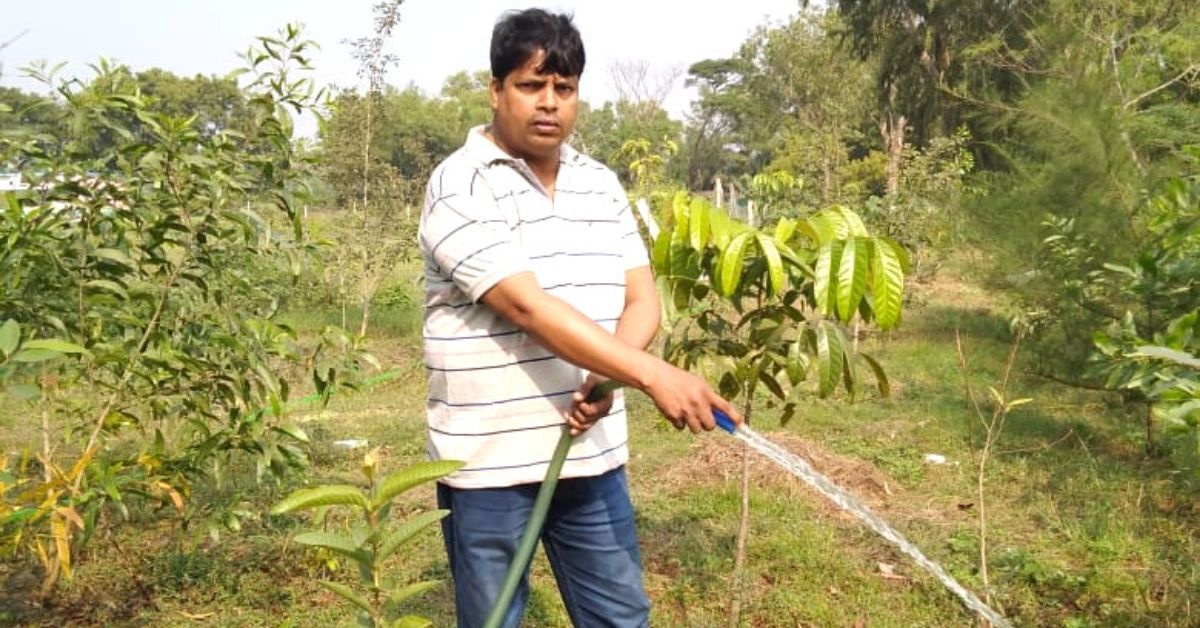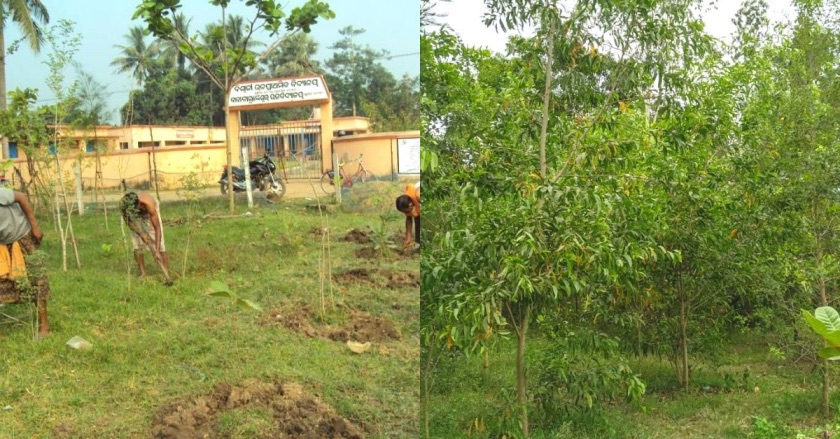Amresh Samant is an electrical engineer at the Paradip Port Trust in the Jagatsinghpur district of Odisha. But during weekends and holidays, the 46-year-old man strives to increase the green cover in his region.
Born and raised in Biswali village which is located in the coastal part of the state, Amresh’s work for the environment stems from the wrath of cyclones and storms that he witnessed over the years. He was pained to see the damage that came with natural disasters. To improve the deteriorating environmental conditions, he formed an NGO called Baba Balunkeswar Gramya Bikash Parisada to plant trees.
“There are at least two cyclones in a year in Odisha. The recent cyclones like Fani, Amphan, Phyan and others lead to floods, disrupt human lives while also damaging the environment. There is also tree-cutting in the remote parts of the villages. Realising the rapid loss of green cover, I decided to plant trees,” he says.
The persistent efforts helped to create “mini forests” across 20 villages of the district. Since he first started, many villagers have also joined and contributed to this cause.
100 Volunteers, 500 Varieties, 1 Lakh Trees

Speaking to The Better India Amresh says that he started planting trees in 1995 along the banks of rivers and lakes. “We also did row plantations along the sides of the roads and other public spaces. The volunteers helped to maintain the trees. However, as the cyclones hit the coast, the trees were uprooted. I learned that such isolated plantations would not help the trees withstand harsh weather conditions. The environmental damage was more than the number of trees getting planted,” he adds.
Hence, in 2015, Amresh decided to start massive tree plantation drives by introducing a concept called — gramya jungle, meaning ‘a rural forest’. “We decided to use barren land and unused spaces to create clusters of trees in surrounding villages. However, the villagers opposed the move saying there was no need to give away land for tree plantation. They failed to understand the need to protect the environment which would in turn help reduce the levels of pollution,” he says.
Amresh says that he conducted special drives and awareness programmes among villagers to explain the importance of environmental conservation. The villagers’ mindsets changed, albeit slowly, as people agreed to dedicate an acre or two for tree plantation.
Since then, he and over 100 volunteers, including NGOs like Adarsh Prayas, have planted 500 varieties of native trees to create 500 to 1,000 clusters of trees in each village. Amresh and other like-minded environmental enthusiasts have planted nearly one lakh trees to date in 20 villages such as Lunkula, Kendrapura, Gadaromita, Biswali, Mahakalapada, Apania, Pradeeepgarh, among others.
Going Beyond Tree Plantation

In 2016, the volunteers planted 300 palm trees to reduce the hazardous impacts caused by lightning in the region. “Lightning bolts disrupted power supply and threatened life in the villages. The tall palm trees will help to reduce these instances,” he adds.
Sukadev Tarei is one of the volunteers working with Amresh for the past five years. Speaking about their conservation efforts he says, “We have turned barren patches of land into green zones with trees now growing 30-feet-tall. Every sapling procured from the organisations is counted, and its entry is registered during the plantation along with its location.”
Sukadev adds that more people have joined and wish to contribute to improving the environment.
Amresh says that clay pots and birdhouses have been placed in these mini forests to provide a haven for birds. He went on to pursue a diploma in Environment and Sustainable Development studies to bring scientific knowledge to his conservation process. “There is more to protecting the environment than just planting trees. So, I completed the course to understand the various aspects of the environment and use the knowledge to increase the greenery in the region,” he adds.
Amresh’s work has received appreciation from the chief minister of the state Naveen Patnaik and even governor Ganeshi Lal.
Speaking of his future plans, he signs off saying, “We plan to plant fruit-bearing trees during the following tree plantation drives to increase the biodiversity cover.”
Edited by Yoshita Rao
No comments:
Post a Comment